|
――――♦――――
|
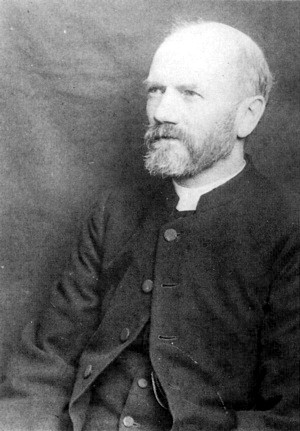 |
|
REV. FREDERICK
R. SMITH.
Taken at Manchester Road Wesleyan Church,
Burnley, 1914.
Photo: courtesy Burnley Reference
Library. |
BY the close of the 19th
Century, it appears, there was no serious ecclesiastical objection to a Wesleyan
Methodist minister writing novels, although adopting a pseudonym and a low
public profile as an author of popular light fiction were probably considered prudent.
This, I think, accounts for the
comparative dearth of information on the life of "JOHN
ACKWORTH", the pen name of the
REVEREND FREDERICK ROBERT
SMITH (1854-1917),
author of many delightful and, in their day, highly popular tales of
Lancashire working-class folk.
|
An old lady in Burnley described him:
"He was a little man with red
hair and a little pointed beard. You could just see him over the top
of the pulpit. He was a very good preacher". He had
"theatrical
mannerisms," while preaching. He would shout but lead
to the shout with a kind of crooning sound (sounds like a siren
song).
A description of Ackworth the preacher. |
What information I have been able to glean about Ackworth the man
(I suspect that the reverend gentleman would have
preferred to be addressed by his nom de plume in a literary context)
I have extracted in the main from several brief obituaries, from
material supplied by the Burnley and Salford reference libraries and from a
biographic sketch, "Clogshop Chronicles, a Victorian Best-seller", by Stanley Wood published in
The Dalesman
(October, 1979).
"John Ackworth" was born at Snaith, Humberside,
on 18th April 1854; as a writer he thus shares with
Samuel Laycock the unusual distinction of being a
Yorkshireman who became a notable author in the Lancashire
dialect, then spoken in various flavours by working-class folk throughout the greater
part of the
county (the Liverpool area excepted) but now, together with the old
industries and lifestyles, almost extinct.
Coming from a family of preachers ― his
great-grandfather, his two grandfathers, his father, and seven
uncles were in the ministry, and at least one brother ― it was to the
Wesleyan college at Headingley, Leeds, that Ackworth went to undertake his theological training
from which he emerged in 1879 to commence his ministry in the Castletown
circuit on the Isle of Man. In 1882 Ackworth married Annie
Bradley of Stockport; they were to have 4 sons and 3 Daughters.
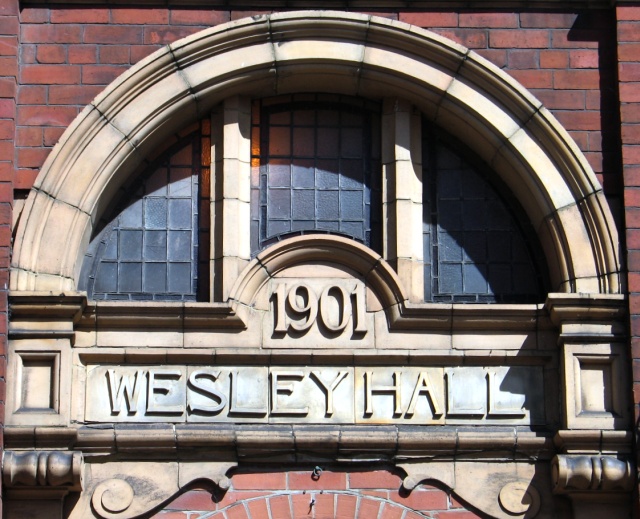
Ackworth's first essays in writing were in The Isle of Man
Examiner, a fact he later acknowledged in The Methodist
Magazine, but it was in 1896 that he achieved great success
with his first book, "Clog Shop
Chronicles", a collection of Methodist tales cast in a
rural setting and featuring now long-forgotten scenes of Lancashire
working-class life and dialect humour ―
|
He was the village knocker-up, and
went his daily rounds with unfailing regularity every
morning, except Sunday, between the hours of four and
six. Over his shoulder he carried a long, light pole,
with wire prongs at the end, with which he used to
rattle at the bedroom windows of the sleepy factory
hands until he received some signal from within that he
had been heard.
Though employed and paid by the "hands," Jethro
regarded himself as representing the masters' interests,
and if a post was unoccupied or a loom "untented" when
the engine started at six o'clock, Jethro felt that it
was a reflection on his professional ability, and was
ashamed and hurt.
This doubtless accounted for the extraordinary zeal
which the old man put into his work. The knocker-up was
expected to go and knock a second time a few minutes
before six to stir up any drowsy one who might,
peradventure, have fallen asleep again, and into this
second round, which was to many the real signal for
rising, Jethro put all his resources. Not only the
windows but the doors were assailed, and in addition he
would give a word of exhortation in his thin piping
voice―
"Bob! Dust ye'r? It's five minutes to six! Ger
up, tha lazy haand (hound). If tha dusn't ger up Aw'll
come an poo' thi aat o' bed."
At the next call he would drop into a coaxing tone-
"Lizer! Jinny! Come, wenches! You'll ne'er ha'
breet een (eyes) if yo' lie i' bed like that."
Beckside's 'Knocker-up' . . . .
Clog Shop Chronicles.
|
__________
"GET
UP!" |
|
"GET
UP!"
the caller calls, "Get up!"
And in the dead of night,
To win the bairns their bite and
sup,
I rise a weary wight.
My flannel dudden donn'd, thrice
o'er
My birds are kiss'd, and then
I with a whistle shut the door
I may not ope again.
By
Joseph Skipsey |
|
|
. . . Such everyday events — set in the mythical cotton-mill villages of Beckside,
Scowcroft, Bramwell, etc., and painted by Ackworth in his charming
idylls — have long since followed the Lancashire cotton
industry, the dialect, and Methodist chapel life into virtual
oblivion. Samuel Smiles,
writing during the Victorian era (ca. 1860) on the history of our developing
road system, suggests that improved communications — or lessening
isolation — was an important factor in the disappearance of our
local dialects and customs, such as those on which Ackworth's tales
are based:
"The imperfect
communication existing between districts had the effect of
perpetuating numerous local dialects, local prejudices, and local
customs, which survive to a certain extent to this day; though they
are rapidly disappearing, to the regret of many, under the influence
of improved facilities for travelling. Every village had its
witches, sometimes of different sorts, and there was scarcely an old
house but had its white lady or moaning old man with a long beard.
There were ghosts in the fens which walked on stilts, while the
sprites of the hill country rode on flashes of fire. But the
village witches and local ghosts have long since disappeared,
excepting perhaps in a few of the less penetrable districts, where
they may still survive.
It is curious to
find that down even to the beginning of the seventeenth century, the
inhabitants of the southern districts of the island regarded those
of the north as a kind of ogres. Lancashire was supposed to be
almost impenetrable—as indeed it was to a considerable extent,—and
inhabited by a half-savage race."
But despite the social and economic changes that were taking place
even as Ackworth was writing, his stories will surely continue to delight today's
readers. As the Birmingham
Daily Gazette's critic put it when reviewing the 10th edition of
"Clog Shop
Chronicles" (still in print):
"The book
is distinctly a work of genius, the author is not only saturated
with his subject, but has the power to convey his impressions
vividly and distinctly. Humour, pathos, tragedy, abound. . . .
From first to last presents feasts of good things."
|
There was a sob
and a rustle at the door, and a pale, shamefaced factory
girl stepped forward, unwrapping as she did so a bundle
containing a five-weeks-old baby, and sobbing audibly
the while. "Look at
it, Mestur," she cried, holding out her little one.
"It's as bonny as ony o' them 'at Jesus tewk in His arms," and then,
pressing closer and almost forcing the baby upon him, she pleaded―"Tak' it, Mestur, tak' it. Aw know Aw'm aat o'
th' kingdom o' God, but Aw dunnot want mi babby to be."
In a moment the student, with face all awork, had snatched
the wee thing from its pleading mother, and was offering a simple
prayer for it as he held it in his arms. Then he sprinkled it
in the "Blessed Names," and, still holding it, prayed again,—prayed
for babe and mother too,—and then, as he handed the infant back, his
eyes wet with tears, he stooped down and tenderly kissed it.
"God bless yo' fur that" cried the agitated mother; "an'
ha'iver lung yo' live, an' wheriver yo' goa, yo' con remember as
there's wun poor woman as 'ull allis be prayin' for yo', if hoo is
nowt but a nowty factory wench an' a woman as is a sinner."
The student does what ordained clergymen
would not
― he christens an
illegitimate child. . . . The
Student. |
Readers unfamiliar with Victorian Lancashire
dialect should not be deterred ― Ackworth employs the
dialect in an economical way, using it to add vivid splashes of
colour to his cameos while ensuring that the story-line is framed in
sufficient plain English to enable the reader to "decode" the short
dialogue passages without recourse to a glossary. Despite the
experience of W. E. Adams, one quickly picks it up . . . .
"Here, however, I could not qualify
the conversation, for the reason that I had not then
made the acquaintance of the Lancashire dialect, which,
as I listened to it at Chorley, was as much like a
foreign language to me as anything I had heard before.
Only a word dropped here and there, such as "bobbin" and
"mill," led me to infer that the people, for part of the
time, were talking about work at the factories."
W. E. Adams: from "Memoires of a
Social Atom"
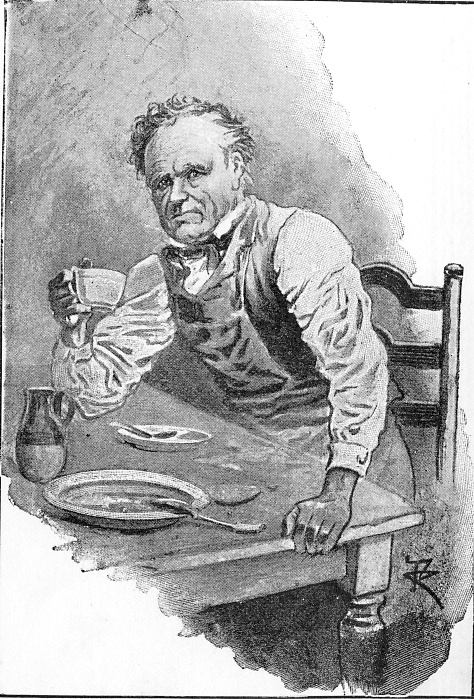
Jabez Longworth, autocratic proprietor of the clog shop, the focal point
of
life in Ackworth's mythical Lancashire mill-village of Beckside.
|
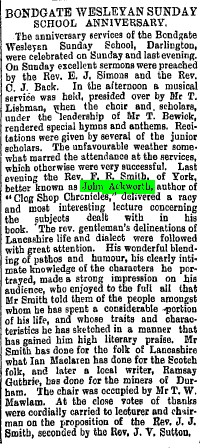 |
|
Northern Echo,
3 Oct. 1899. |
During the next 11 years Ackworth built on the "Clog Shop's"
immediate success with nine other titles, including two sequels to the "Clog Shop",
"Beckside Lights" (1897) and
"Doxie Dent" (1899), the heroine of the latter being an
enterprising mill lass of the kind that Gracie Fields was later to
immortalise on film. Ackworth gathered together other of his
Lancashire stories in the "Scowcroft Critics" (1898) and "The Mangle
House" (1902). "The Coming of the Preachers" (1901) is an
attractive 18th century tale, which chronicles the rise of
Methodism. "The Minder" (1900),
subtitled "The Story Of The Courtship, Call And Conflicts Of John
Ledger, Minder And Minister", recounts the trails and
tribulations of an impoverished young "minder" (a machine supervisor
in a cotton-mill) who eventually becomes a Methodist minister and,
after a tortuous courtship, marries the right girl. Set in the
fictional mill-town of Bramwell, the reader cannot help harking back
to Beckside or Scrowcroft and to their loveable characters; thus The Birmingham Gazette
— "Never have we seen a
finer study of principle and passion, religious fervour and human
love, than in the courtships and conflicts of John Ledger. It
is long since we read a finer novel".
|
The painter's shop was an institution in Bramwell; the new ministers
as they arrived began by suspecting and disliking it, then they came
to tolerate and fear it, and generally ended by accepting and making
the best of it. It was a sort of left wrist of the body
ecclesiastical, where the pulse of the circuit might be felt. It was
also the best place to procure or at least to hear of supplies for
vacant pulpits, and its proximity to the cattle market made it a
convenient place for the leaving of parcels of circuit plans,
magazines, and messages for country officials. Superintendents,
therefore, made use of it somewhat frequently, and all the more
willingly, perhaps, because they could always pick up there the
latest circuit gossip and the first mutterings of ecclesiastical
thunderstorms, with the comfortable knowledge that the trouble, when
it did come, would certainly not be worse than it had been
represented at the paint shop.
The ecclesiastical parliament building
of Bramwell . . . . "The
Minder" |
"Old Wenyon's Will" (1904) takes as its principal
theme the problems that stem from a bequest, by "Old Wenyon", of a
profitable public house to his disliked nephew, an ardent Methodist
teetotaller, on the condition that he and his family live there.
This otherwise charming story—a triumph for teetotalism and a
sound defeat for cupidity—includes a vivid depiction of alcoholic Billy Stiff's attack of
"cold turkey", which suggests that in his pastoral life Ackworth
had encountered alcoholism in the raw; thus a convincing portrayal of
that "rambling, raving lodger's" withdrawal symptoms . . . .
|
It took nearly an hour, and more
than one weary chase, to get the drink-ridden man to the
tollhouse, and once there the quiet little home became a
sort of pandemonium. Billy snatched at the
wonderful cakes like a ravenous beast, and then spat the
food out and yelled for drink. Twice he had to be
dragged from the door by main force, and twice he
collapsed in hopeless tears. He cursed the drink
in language that made his keepers shudder, and then
cursed them for keeping it from him. He coaxed,
and pleaded, and promised, and then laughed, and mocked,
and swore. He called Jeff all the tragedy names he
could remember, and made slobbering, demented appeals to
his wife as the "angel of the bower" . . . . and a
moment later Jeff experienced the greatest amazement of
that amazing day, for he found a man clinging to his
bare legs and sobbing, not with the whining, drunken
bathos of other occasions, but in deep, solemnest
earnestness, sobbing as only a man can sob.
The craving of alcoholic Billy Stiff. . .
. from Old Wenyon's Will |
A popular preacher, "Life's Working
Creed"― Ackworth's final title (so far as I've discovered) ― is a volume of his sermons "on the present day meaning
of the Epistle of James" (1909), which among other things serve to
provide the present day reader of Ackworth's tales with an insight
into the preaching that the Wesleyan worshippers of Beckside,
Scowcroft, Bramwell and elsewhere might well have heard . . . .
|
It is all very well for
comfortably placed ministers, arm-chair philosophers, successful
authors, and able editors to talk about the blessings of poverty—let
them come and try it. It is very beautiful to write on the 'simple
life' from a carpeted study and a soft easy-chair; let them come and
live in 71 Brick Street, and maintain a family on a pound a week,
and then see where their moralizings will be. . . .
Now, in this twentieth century, we are experiencing both the
blessedness of Socialism as an ideal, and its immense difficulty as
a practical system. The difficulty of all difficulties is how to
render help to a poor man without injuring him in character . . . .
Man on earth is the son of God in his gymnasium, and that place of
exercise has no value save what it derives from its relation to the
student. The gymnast does not spend his time in collecting and
hoarding up gymnastic appliances, his success is not measured by the
number of clubs, ladders, push-balls he accumulates, but by the
state of his muscles and the degree to which these instruments have
told upon his physical powers. Most of us have mysterious appliances
behind our bath-room doors, and Indian clubs and dumb-bells in our
bedrooms; we take golf, tennis, cricket, walking exercise, bicycling,
sea-side week-ends, and summer holidays, and yet we do not develop
our muscles half so thoroughly as that rough lad who spends his days
pulling trucks about on a pit bank. So with life—the soul's the
thing! What will benefit and develop—that is the question. . . . The soul is a young god, a glorious, undeveloped Hercules. You don't
feed giants on gingerbread and jam trifles; you don't wheel giants
about in perambulators and coddle them in cotton-wool and muslin
frills! You cannot develop the sinews of a giant by teaching him to
wave a fan. Your Hercules must have the labours of Hercules if he
would finally sit amongst the gods. . .
We believe in the
preciousness of human life, we know the disgraceful
details of infant mortality, the high death-rate in
slums, the lack of commonest necessities amongst our
fellows. We cry over descriptions of them in the
papers, we revel in luxurious pity under appeals at
public meetings; but, for all our tears and all our
sighs, if our faith carries us no further than that, it
is dead faith.
Ackworth's preaching. . . . from
Life's Working Creed. |
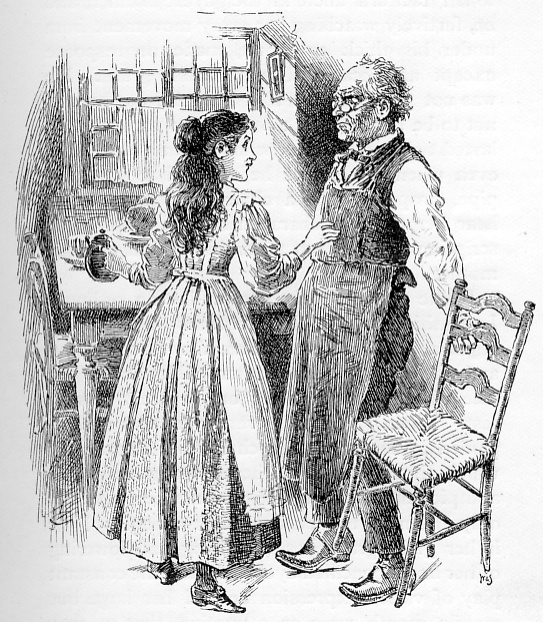
The "clogger" being
lectured by the irrepressible Doxie Dent ―
note Jabe's
Lancashire clogs.
|
LANCASHIRE
CLOGS:
were everyday wear for many Lancashire working-class
folk until (about) the 1920s. Unlike wooden Dutch
clogs, Lancashire clogs are a type of heavy boot or shoe
with lace-up cowhide sides and uppers and, typically,
thick wooden soles. The soles were normally carved
from alder (in wet places is extremely durable) or
unseasoned sycamore; both are easily worked and resist splitting. The finished clog
is shod with "irons", an iron edging similar to a
horse-shoe, designed to protect the sole
from wear. It took a "clogger" about two hours to
make the soles and a further two hours to make the
uppers.
Lancashire is also known for its "clog dancing", said to
be derived from cotton-mill workers emulating the sound
of their looms with their clogs. Dancing, or
"neet" clogs, don't have irons and are lighter than the
heavier working clogs. Ash is considered a good wood to
use for dancing clogs due to it being light and springy,
with plenty of bounce and a ringing tone (although the
young lady pictured was wearing rubber soles to prevent
slipping). The
cowhide uppers are sometimes highly tooled (decorated), coloured, and
might also have bells attached of the type
worn by Morris dancers—it's clogs similar to these that Jabe the clogger presents to
his adored niece, Doxie Dent. |
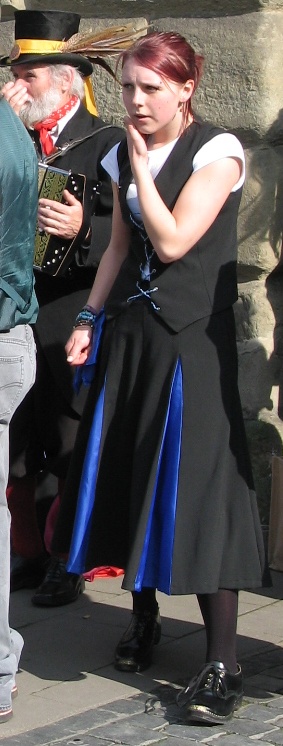 |
|
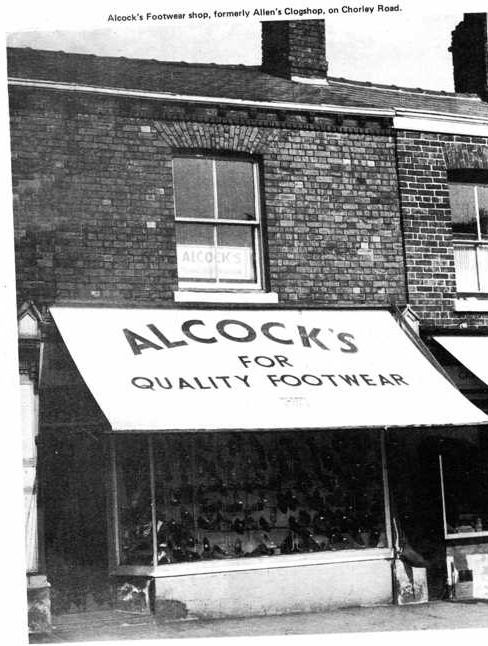 |
|
Before the close of the 19th
century, Alcock's footwear shop, Chorley Road, Swinton (above), had been a clog
shop owned by James Allen, a friend of the Rev. Fred
Smith who at that time (1891-94) was minister of St.
Paul's. Fred would call at the shop
for a chat every Monday morning ― as author "John Ackworth",
he would later cast local scenes and characters such as these as the fictional Beckside clog shop and
its acerbic (but kindly) proprietor, Jabez Longworth.
Beckside, incidentally, is thought to be modelled on Boothstown,
Salford, although Stoneclough near
Bolton is another candidate; in all probability Beckside
is a composite drawn from a number of such places.
Photo: courtesy Chris Carson. |
It's interesting to compare Ackworth with
two of the other authors listed in the website
index: the Lancashire dialect
author and poet,
Edwin Waugh, and Isabella Fyvie
Mayo ("Edward Garrett"), author of many moral stories and a
splendid autobiography.
Both Waugh and Ackworth portray ― even caricature ― the same types of
people; artisans, tradesmen,
working-class folk together with the occasional representative of
the middle classes, such as the local parson or a member of the
"squirearchy", all
of whom are presented in a rural Lancashire setting. In his short
tales of Lancashire life (e.g. "Tufts of Heater" I. &
II. and "Besom
Ben"), Waugh makes much more extensive use
of the dialect than Ackworth, and a
lexicon is a useful
companion for the uninitiated.
Slight differences in dialect crop up between the two, Waugh's being native
to the Rochdale area while Ackworth's is that of Bolton. A prominent difference in usage is in the
form of female address; Waugh employs the more common and gentle "lass"
while Ackworth's use of the much earthier "wench" takes some
coming to terms with
as a polite form of address. This is Waugh writing
about variations in the dialect . . . .
"And here it may be noticed that persons
who know little or nothing of the dialect of Lancashire are apt to
think of it as one in form and sound throughout the county, and
expect it to assume one unvaried feature whenever it is represented
in writing. This is a mistake, for there often exist
considerable shades of difference,—even in places not more than
eight or ten miles apart,—in the expression, and in the form of
words which mean the same thing; and sometimes the language of a
very limited locality though bearing the same general
characteristics as the dialect of the county in general, is rendered
still more perceptibly distinctive in feature by idioms and proverbs
peculiar to that particular spot."
Edwin Waugh: Preface to
Sketches of Lancashire Life,
1855.
But the most apparent
differences lie in attitudes to religion and choice of setting:
Waugh's tales are firmly secular whereas Ackworth's, while not overtly religious, adhere strictly to the
beliefs, the dogmatism and
the ways of life of a close-knit rural Methodist community.
|
There was probably not a shape in
hats or a cut in coats, from the early years of the
century to the very latest fashion, that was not
represented in that procession. Wide brims and
brims that were mere rims, bell-shaped and
"long-sleeved," chimneypots and bell-toppers, all were
there; and an assortment of black coats, from Nat
Scholes' sage-green cut-away to the newest and glossiest
superfine frock, that would have completely equipped the
nineteenth-century section of a sartorial museum.
Silently, sedately, with most obvious
self-consciousness, they filed out, as though a
wondering world were looking on.
Poor souls! . . . . there was nobody at all to behold
all this pride and glory. I beg pardon. In
almost every cottage door stood a perspiring and already
exhausted mother, still en deshabille, and as little
Tommy in his new velveteen suit and monster posy, or
Jane in her gay frock or gayer hat, moved proudly past,
there was a sudden glistening of motherly eyes, a sudden
uplifting of weary faces, and the work and worry of many
days seemed all too little for the sweet reward of that
proud moment.
A Sunday school procession. . .
. The Mangle House. |
For
instance, in Beckside, the scene of many of Ackworth's tales, "the
law as to the marriage with unbelievers, which according to Beckside
canons of interpretation meant all non-church members, was clear and
uncompromising" ― transgressors are shunned. Gamblers
are considered to lie well beyond the pale ― "An' whoa wur it as
ran a race fur brass yesterday amung bettors an' gamblers an'
pidgin-flyers?" asks the scandalised Sunday school
superintendent having received intelligence of such activity. And while Beckside has a public house, the chapel-going
villagers would regard it "sinful" to enter therein, let
alone partake; and the reader isn't invited across
its threshold either. Instead, Beckside's teetotal clog shop
replaces the village "pub" as the hub of information and governmental
decision-taking, Jabez
Longworth the "clogger" being its resident Speaker, while the
chapel and its Sunday school, visiting preachers and the "super"
(Methodist circuit superintendant) are called into play as occasion
demands. By comparison, Waugh often chooses the more worldly
setting of the town-square "pub" or a wayside inn in which
ale-fuelled conviviality is the order of the day. The publican
or one of his boozing cronies presides over the discussion, while an
attendant "lass" hovers to ensure that our speakers' thirsts are
adequately slaked
during an oft-lengthy session . . . .
|
"Are we to sit dry-mouth,
Bill, or how?"
"Nawe. Here, Betty, bring us a quart an' a quiftin'-pot."
"Ay; be sharp, Betty; I'm as dry as soot."
(BETTY
brings the drink.)
"Chalk it up, Betty; I haven't a hawp'ny about mi rags.
. . . Trinel; buttle, an' let's sup."
"I will, my lad. . . . An' I say, Betty, put that dur
to, an' let's ha' th' hole to ersels. Theer!
Now then, Bill, wipe thi face, and tak howd! We're
as reet as a ribbin." (Ed.—well, until the unwelcome
arrival on the scene of Bill's better half!)
Waugh, from
Bitter-Sweet. |
. . . . or . . . .
|
"Heigh, Hal o'
Nab's, an' Sam, an' Sue;
Heigh, Jonathan, art thou theer too?
We're o' alike,—there's nought to do;
So bring a quart afore-us."
Waugh, from
A
Run up the Rhine. |
|
"The next three days were the most
tormenting in Jeff's life. His wife had all a
childless woman's passion for nursing anything and
everything that came in her way, and all a nurse's
unreasonable imperiousness. Their only bed in the
cot across the road was appropriated for this
disreputable, spouting tramp; his wife occupied the long
settle, and he had to stretch his long legs where he
could. His wife was inevitable and had to be
endured, but why should he be tyrannised over by a
rambling, raving lodger, a starvation footpad, simply
because he 'hed sich grand eyes and quoted poetry'?"
A 'Shakesperian tramp' takes residence. . .
. from Old Wenyon's Will |
But this doesn't
mean that Waugh's tales are confined to inebriated antics ― his
popular "Barrel Organ" is
just one
notable departure from the tap-room ― or that those of Ackworth
are in any way stodgy or sanctimonious, a charge that can
sometimes be laid at the door of Isabella Fyvie Mayo.
Whereas Ackworth's tales have an unmistakable Methodist flavour, but
only that, Isabella's occasional lengthy bouts
of Christian preaching suggest that she could have made a successful
career for herself in the pulpit; indeed, strident
sermonizing pervades some ― but thankfully not all ― of her stories, "By
Still Waters" being an example of her religious beliefs
running amok and "Rab
Bethune's Double" of them being held in check. Ackworth takes a much more
subtle approach, contenting himself with relating
episodes in the life of his small Methodist community and conveying
his
message by way of parable rather than sermon.
|
The natural reticence of the
North-countryman leads him to avoid the use of "love"
whenever possible; and in Lancashire, "loike," the
weaker word, has come to be most commonly used about
amatory matters, and expresses the strongest possible
affection. When, therefore, Mrs. Barber employed
this term about her daughter's sentiments towards Luke
Yates, there was no room for doubt as to what she meant
by it. And if there had been, [her] manner as she
made the statement with which the last chapter closed
removed any such possibility.
From . . . . "Leah's
Love" |
Other than at Castletown and Worthing, Ackworth's ministry was served mostly in
northern circuits, including Farnworth, Lytham, Sheffield, Shotley
Bridge, York, St. Annes-on-Sea, St. Helens, Eccles (twice), Swinton,
and Manchester. His final posting was to Burnley in 1909
where, following his retirement in 1912, he became a supernumerary.
|
"You're come, Mr. Ledger, to one of
the most famous towns in Lancashire," said Betty . . . .
"Famous for what?" John asked, with an incredulous glance
round at the long chimneys, the heavy smoke, and the
dingy brick buildings.
"Famous for ugliness, sir, pure unmitigated colossal
ugliness; but never mind, it's the people that make the
place, and they are 'gradely folk.' We are jolly
here, sir; some of us jolly bad . . . . but all jolly."
A typical Ackworth setting . . . ."The
Minder". |
For some years
Ackworth had been in indifferent health, his illness eventually becoming
serious, and he died following an operation at the Victoria Hospital,
Burnley, on November 13th. 1917, leaving a widow, four sons, and three
daughters. Three sons were at the time serving in the Army, two being at
the front. John Ackworth's funeral took place at Manchester
Road Wesleyan Chapel, Burnley (now a block of flats), and he was buried in Burnley Cemetery
(grave A1716).
Annie died at the home of a daughter at Heaton Chapel, Stockport, on
27th December, 1943, aged 88.
|
. . . . He was the village
tripe-dresser, who did his business in a little wooden
lock-up shop which stood in the open space opposite the
big "Co-op. store." . . . . Talk was the breath of life to him, and as he
posed as a sort of village oracle . . . . A little,
emphatic, pugnacious individual, a bundle of
angularities and a walking compendium of crabbèd
Lancashire philosophy, he was, in spite of his trade, a
vegetarian, a teetotaler, and an anti-vaccinator; and
had a knobby, oversized head that was thatched with a
coat of coarse, dark-red hair, and which he wore at all
times and seasons, outdoor and in, uncovered. He
loved a wrangle as he loved nothing else in life, and he
and the schoolmistress were soon on terms of the most
intimate and delightful opposition. All subjects
were alike to him—and to her; neither ever gave way an
inch, and he being a philosopher, and she a woman, they
scorned the pettifogging limitations of logic and
natural sequence, and skipped about from topic to topic
with bewildering independence. He lodged with his
sister, Carrie's landlady, and soon learnt to know at
what hour she was ready to accept the gage of battle;
then, if it pleased him so to do, he would strut into
the parlour, and, spreading himself before the fire,
fling out a sentence incomprehensible to any third
person unacquainted with the last discussion, but
rousing and feather-raising to his eager lady disputant .
. . . That his own respect for her acuteness led him to
adopt her views and defend them against all comers, in
spite of his fierce opposition of them with her, was a
mere detail, and consistency was a virtue he most
heartily despised.
A typical Ackworth character . . . .
from Crooked Roots. |
As a
preacher, Ackworth was described as "striking, original, fearless,
thought-provoking, conscience-stirring, and not seldom attended with
remarkable power;" as a pastor, "he carried light and cheer wherever he
went."
|
. . . . preaching is a very serious
business. The power by whom he is commissioned,
the nature of the truths he announces, the incalculable
value of the souls to whom he is sent, and the
tremendous issues at stake, make the vocation of the
preacher positively oppressive in its responsibility.
Preaching, from . . . .
Life's Working Creed.
"To preach was his passion; it was the delight of his life. His
earnest yet genial disposition lit up the church. His preaching
consumed him as fire consumes dry timber."
A description of Ackworth the preacher. |
――――♦―――――
|